The show must go on
Natasha Chang and Marykate Palaris|September 20, 2020
While sitting down and teaching through a screen has become the new normal for teachers who cover traditional academic topics, things are more complicated for those classes whose very objective is to perform. In order to adapt, performing arts classes on campus have taken unique approaches to maintain their skills from home.
SHOW CHOIR
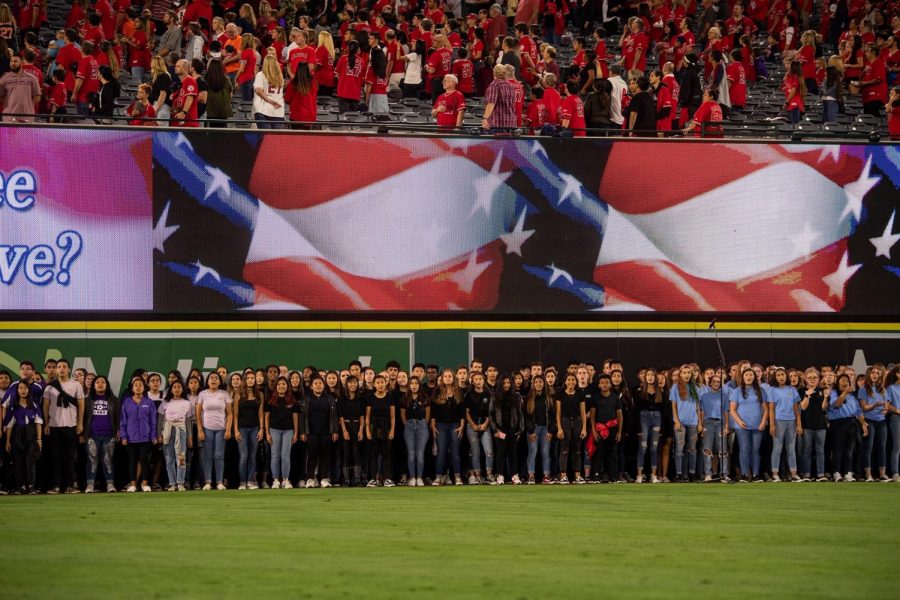
During distance learning, Diamond Bar High School’s Choir is retaining its harmony via Zoom rehearsals.
Though students still rehearse songs synchronously, as they did when they were in the classroom, now everyone except the director is muted. Diamond Tones president Kasee Verma said that there are difficulties to this, as it is impossible to know if students are singing at the right pitch.
“It’s harder to make sure that we all have the notes correct or are doing the correct moves,” Verma said. “But it keeps us engaged and ready for when we get to come back to school.”
Besides vocal activities, choir students are continuing to bond online by playing games such as 20 Questions and “Never Have I Ever.”
“It’s a great way for everyone in choir to connect,” Verma said.
DANCE
Because its activity relies on coordination between every member of the team, the DBHS Dance Company has had more than its fair share of struggles regarding distance learning.
Due to their inability to practice together, online classes are focused on conditioning and self-improvement, which will help dancers’ performance once they return to the stage.
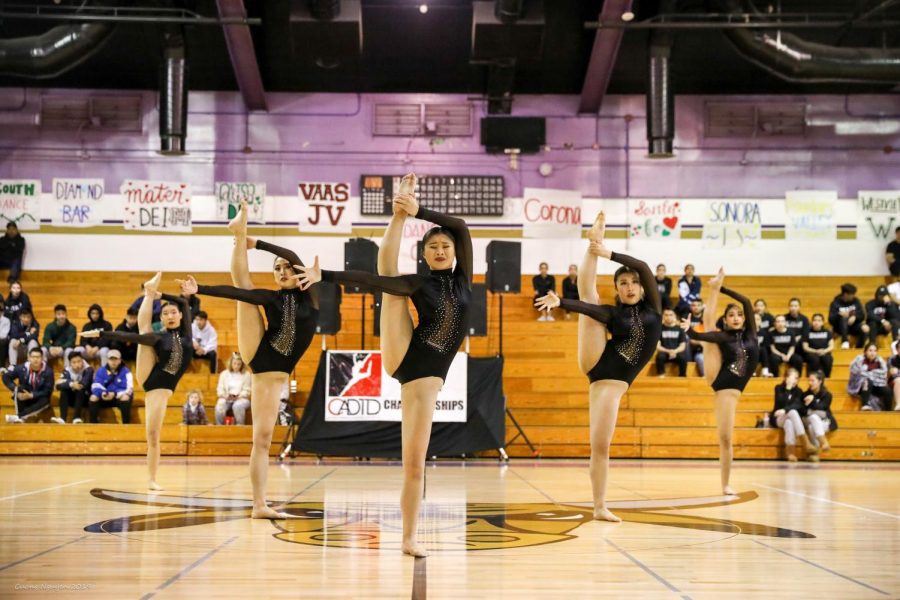
The self-improvement studies emphasize how an individual’s body weight connects to the ground. Additionally, choreography-related tasks are assigned via Flipgrid, an application in which a student may post videos for their teacher and peers to see.
“The restrictions of distance learning enables dancers to be more in tune with their bodies and to strive for self-improvement,” student leader Shulamite Yang said via Messenger.
The biggest disadvantage of distance learning for the Dance Company is the inability to rehearse for competitions.
“Competitions are the highlight of our year,” Yang said.
DRAMA

Senior Pailey Kao, the secretary of the Drama Department, said that the learning environment of the class is interactive, with improv activities done in the beginning of each class, followed by acting technique lessons.
“[It] not only improves our acting skills, but also allows our class to bond,” Kao said via Messenger.
In addition to these other assignments, she said that students are working in groups on presentations about important Broadway figures in order to enhance their theater knowledge.
“Even though it’s not hands-on, we are still learning and improving,” Kao said
BAND AND ORCHESTRA
During summer, leaders of each instrumental music program discussed plausible ways to circumvent the difficulties presented by distance learning, and collectively decided that the focus of their class would need to change in order to adapt.
“We needed to pivot our purpose temporarily away from group performance to individual skill and knowledge improvement,” DBHS music director Steven Acciani said via email.
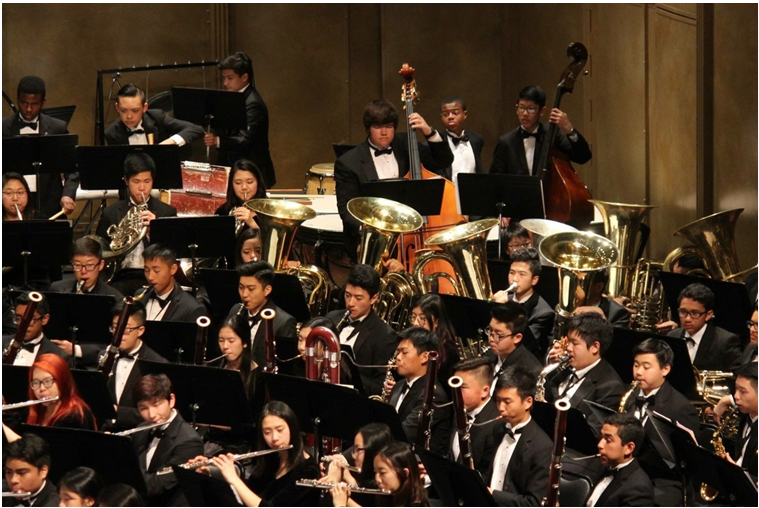
To make this change, Acciani is using various online applications, like Google Classroom, where students can access sheet music and complete weekly assignments.
Acciani said that regardless of being apart, students still perform together during class meetings. After they play, they receive feedback and interact with one another.
“We have to trust that the students are doing what we ask of them, and we are teaching them to better self evaluate,” Acciani said.
Everyday the different band and orchestra groups meet in class, but usually in their respective sections, rather than as an ensemble.
“As the second violin co-section leader, I have a group of kids I need to supervise and teach,” said sophomore Allison Yuh. “Since playing over Zoom does not work at all, we make them play by themselves and give constructive criticism.”
The group is also given assignments every three weeks, which consist of playing specific pieces to track each individual’s progress. Every Monday and Friday are designated for rehearsing as an entire ensemble, where the section leaders play out loud and the rest of the group play along muted.
“I think it’s a great way to get individual help,” Yuh said. “ But all of us are kind of sad we can’t see each other and welcome new members.”
COMMERCIAL MUSIC
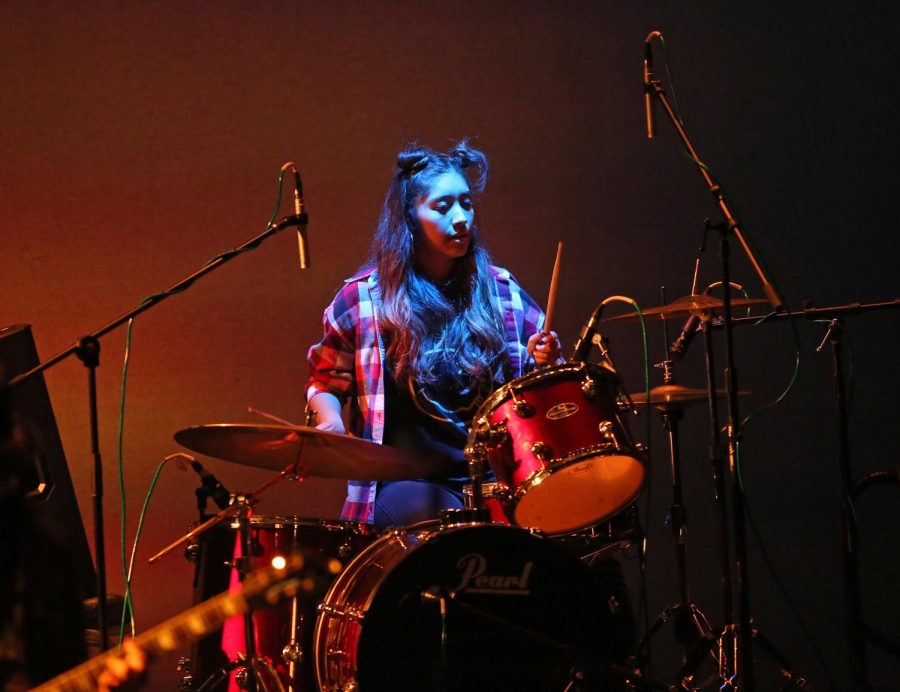
Though one may think that, as a performing arts class, Commercial Music would be suffering many of the same plights as other, similar classes on campus, the opposite is true–they’re thriving.
“It’s actually made easier through software that is made for music,” student leader Brandon Kwan said via messenger.
Through Zoom, they continue the usual activities that take place this time of year, like teaching basic music theory.
Students practice their instruments twice a week, and occasionally the group’s adviser, Derek Kowalski has invited guest musicians to the class.
COLORGUARD
Both a sport and a performing art, Color Guard has been handling these tough times as best as they can with using virtual applications.
“We started with giving everyone the proper equipment at home, freshmen with flags while the returning members have flags and weapons at home,” said senior captain Gracel Mutuc.
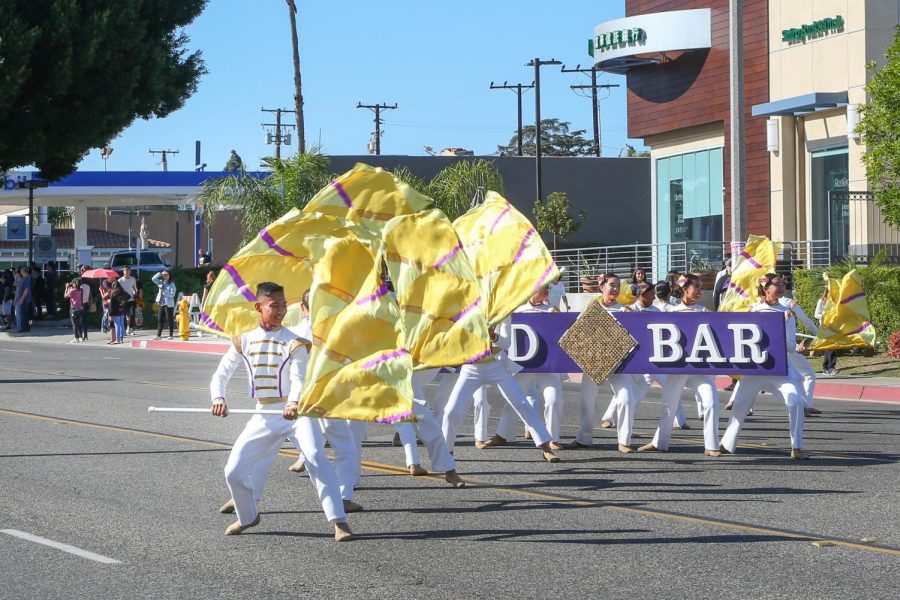
Color Guard student leaders also provide inexperienced members with video tutorials posted through Google Classroom, while returning members go over exercises from seasons prior.
“We are still approaching this the same way we would in person but since it is online we are going slower than we would like,” said Mutuc. “Since I’m a senior and this is my last year with my team, I am bummed that I might not be able to spin and connect with my team due to our circumstances.”
Despite the circumstances, Color Guard is hopeful that they can use this year to improve underclassmen’s skills for successful seasons after the pandemic.
MARCHING BAND
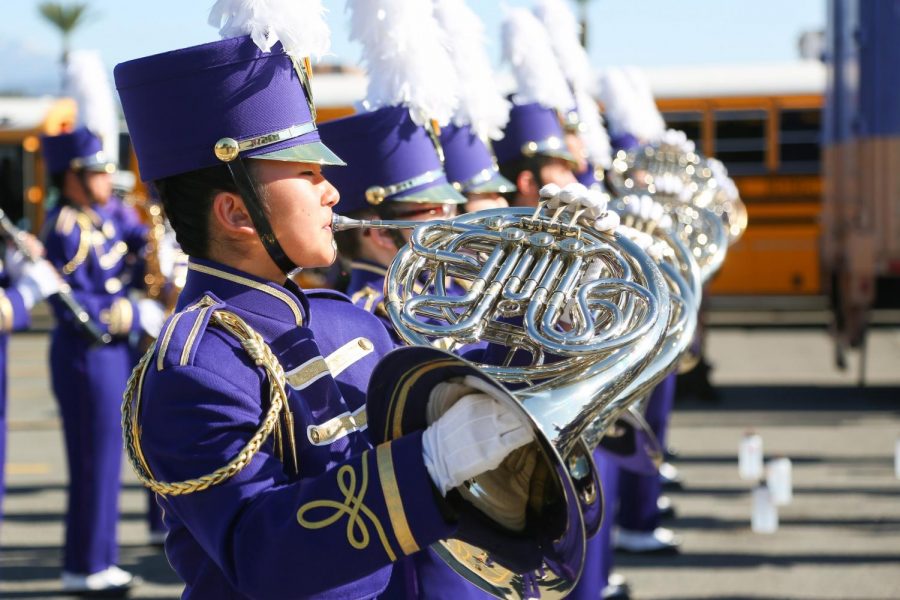
Undeterred by not being able to meet in-person for practice, the band program is still operating at full steam. Classes are mostly focused on personal skill improvement during virtual meetings via Zoom.
“We make adjustments for the troubles that the pandemic has caused,” said senior section leader Peter Chang. “Once we are able to meet in-person, we will emerge stronger and ready to perform at our highest levels.”
Like other instrumental music groups, marching band doesn’t always meet as a full group. When the full ensemble does gather online together to work on the repertoire, however, only the section leaders play as an example for others.
“I am glad that our band directors have chosen this route to take,” said Chang. “Even in the face of adversity, the band continues to prove that we are a rigorous and adaptive program that will never stop improving.”
DRUMLINE
Quick to adjust to the pandemic, drumline actually started hosting weekly meetings a week after school shut down in March.
“These meetings were somewhat of a mental check up on how everybody was doing,” said senior section leader Julian Martinez.
The group wasted no time, taking a month after the lockdown to recuperate, before they continued their practice regimen.
“We would split up between the rums and the front ensemble to slowly learn more and more about technique,” said Martinez. “It wasn’t anything crazy but definitely a way to reconnect and back into the swing of things.”
It was during this time that drumline also started to welcome the incoming freshmen, getting them involved with their regular wellness check-up calls. For this school year, the ensemble has two online practices a week, each two hours long.
“I feel drumline has really taken this time to grow and learn together,” said Martinez. “It’s definitely been a learning experience for everybody.”
Your donation will support the student journalists of Diamond Bar High School. Your contribution will allow us to purchase equipment and cover our annual website hosting costs.








